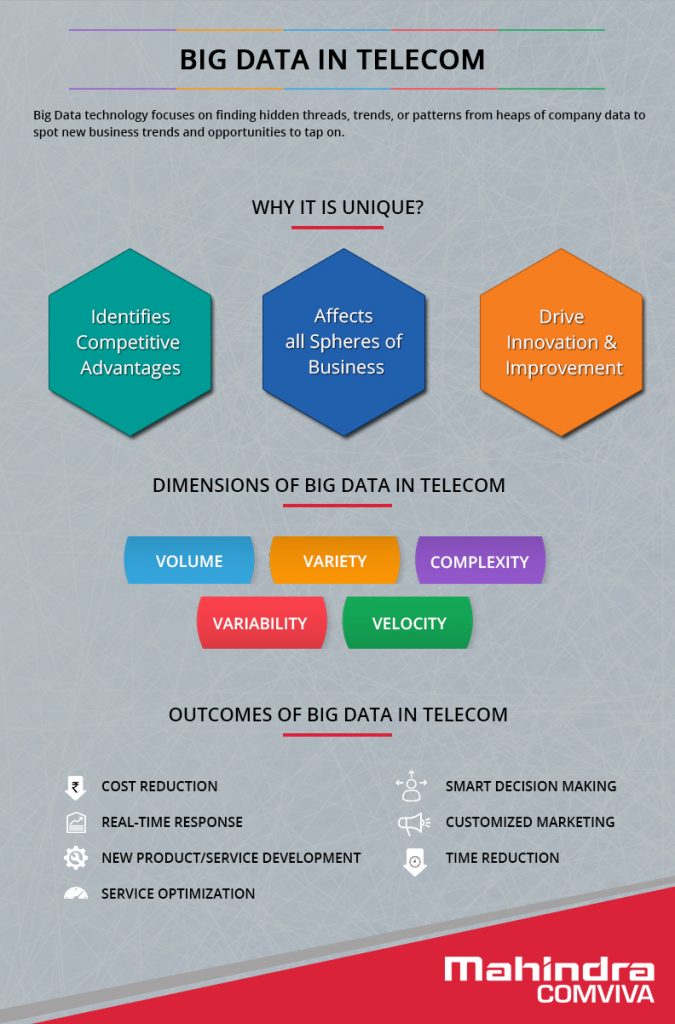Since its introduction 2001, big data has improved the health of many industries and the telecom industry is no different. The industry is witnessing a phase of stagnant growth and thus, every telecom operator is searching for new ways to increase their ARPU, overall revenue and profits. Owing to this maturity phase, many of the telecom operators are turning to new technologies like big data to enhance their service value.
Big data is being generated by everything around all the time majorly by all digital processes and social media exchange. Big data is being created from multiple sources at an alarming volume, velocity and variation. In order to extract value from big data the telecom companies need optimal processing capabilities, analytical power and skills to spot new business trends and opportunities to tap on. To begin with, operators can experiment with the data they have on hand in order to see the kind of connections and correlations it unveils. Operators have sought for decades to make the best use of information to improve their business capabilities and their answer lies in big data analytics.
Why is big data technology unique?
Big data technology focuses on finding hidden threads, trends, or patterns from heaps of company data. It represents significant information which can open new avenues of opportunities and the way this information is analyzed to help tap on those underlying opportunities. The three core reasons behind big data being in the forefront are:
- Finds competitive advantages
- Affects all spheres of business
- Drive innovation and improvement

Dimensions of Big Data in Telecom
The concept of big data gained momentum is the early 2000s and is breaking the threshold of business potential. The dimensions in big data are:
Volume– The telecom operators collect customer data from various sources including usage history, VAS subscription details, service transactions, location and lot more. In the past, data storage used to be a problem but now, the advent of new technologies has eased the burden of large volume of data storage.
Velocity– In the telecommunication sector, data streams in at an unparalleled speed and thus, the storage and analysis must be done in a timely manner. Payments, sensors, RFID tags etc. are driving the requirement to deal with unprecedented amount of data in the near-real time.
Variety- There are different data formats in telecom that get collected.The different types of data include structured, traditional databases with numeric data to unstructured text documents, financial transactions and emails.
Variability-In addition to the high velocity and variety of data, the flow of data may be inconsistent with periodic peaks. Daily, seasonal or event-triggered data loads may be challenging to manage- even more challenging with unstructured data.
Complexity –Telecom data arrives from multiple sources, which makes it difficult to be inter-link and transform across systems and services. However, it becomes important to connect data relationships, hierarchies and multiple data linkages, or data can go out of control.
Importance of Big Data in the Telecom Industry
The advent of smartphones, increased subscriber base and equally increased consumption worldwide, shows that the telecom operators have absolutely no dearth of data. They are engaged in collecting data from usage transactions, network performance data, data sourced from cell-site, service offering and portfolio data spread across geographies and back-office data alongwith the real-time data. Sitting atop this heap of data can reap out trends and patterns on customers’ usage, behaviour and complete end-to-end subscriber insights. Other benefits include:
- It saves time by correlating a 360-degree view from fragments of user data, which otherwise is a complex and time consuming done when it’s done manually.
- The quality of the collected data is needed to be polished, trimmed and de-duplicated. This is achieved easily by simple algorithms of big data technologies.
- As the role of telecom is evolving in the economy, technologies like big data give them access to leverage and exploit every bit of customer data to serve the people better quality.
- The rise of many telecom players necessitates each of them to build up key competitive advantages of their operations and services that are extracted from big data monetization.
- Big data is not a replacement of the traditional analytics, but an add-on to the operators to fill the gap between of collecting data and digging valuable business insights.
- The information or insights from big data is asked for and consumed to make better decisions or to create new products and services. This way the whole infrastructure evolves to fulfill the demand in a better way.
- The data collected arrives from different silos of the operator, namely- service provider’s business, network data, IT department, marketing and product departments, etc. Big data co-joins all of it to evolve as a unified business unit.
- Some other benefits of big data that directly helps in saving costs and time are:
- Lowering down the need for data compression
- Reduce data maintenance and storage cost
- Reduced time in running manual queries on data
- Leverage commodity hardware
- Response in real-time
- Easy implementation of any data model from any data source
Outcome of Big Data in Telecom Industry:
Today, the telecommunication sector has found big data as irreplaceably useful. The importance of big data doesn’t rely on the data volume you have but, what is done with it. Data can be collected from any available source and data analysis can be carried out to find results that enable:
- Cost reduction
- Time reduction
- New product/service development
- Service optimization
- Smart decision making
Big data combined with analytics, can accomplish many telecom service tasks which promise high sales and increased ARPU, among other things like:
- Determining root case of issues, defects and failures in near-real time
- Creating offers based on customer’s buying habits
- Offering customized services
- Analyzing value proportions
- Calculating risk portfolio within minutes
Conclusion
It is quite important to be kept in mind that the core value from big data arrives not from data in its raw form but, from data processing and analytics along with the insights, products and services emerging from the data analysis. The solution effectively utilizes structured and unstructured data to improve decision making and alleviating business problems.






